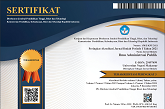Alternative Tourism Attraction Policy of Makassar City
(1) Politeknik Pariwisata Makassar, South Sulawesi, Indonesia
(2) Politeknik Pariwisata Makassar, South Sulawesi, Indonesia
(3) Universitas Negeri Makassar, South Sulawesi, Indonesia
(*) Corresponding Author
DOI: https://doi.org/10.26858/jiap.v13i1.48390
Abstract
This study aims to examine the creation of alternative tourism attractions in Makassar City. It is qualitative research, and the informants include the Mayor of Makassar, the Head of the Department of Tourism and Creative Economy, the Head of the Makassar District, the Chairman of the Regional Board of the Indonesian Hotel and Restaurant Association (PHRI) in South Sulawesi, the Chairman of the Regional Board of the Association of Indonesian Tours and Travel Agencies (ASITA) in South Sulawesi, and the local community. Data was collected through observation, interviews, and documentation. The data analysis technique employed was qualitative descriptive analysis, involving data reduction, data presentation, and conclusion drawing or verification. The research findings indicate that the implementation of the Makassar Tidak Rantasa (MTR) Policy, which includes the Lorong Garden program, has successfully transformed several alleys or lanes into cleaner, healthier, and more attractive places to visit, particularly in the Makassar District. However, these changes have not yet created alternative tourism attractions. The recommendation from this study emphasizes the need to consider the principles of tourism attraction management to follow up on the Lorong Garden program and ultimately create alternative tourism attractions in Makassar City.
Keywords
Full Text:
PDFReferences
Albuquerque, H., Costa, C., & Martins, F. (2018). The use of Geographical Information Systems for Tourism Marketing purposes in Aveiro region (Portugal). Tourism Management Perspectives, 26, 172–178. https://doi.org/https://doi.org/10.1016/j.tmp.2017.10.009
Benites-Lazaro, L. L., & Mello-Théry, N. A. (2017). CSR as a legitimatizing tool in carbon market: Evidence from Latin America’s Clean Development Mechanism. Journal of Cleaner Production, 149, 218–226.
Block, N. T. (2007). Handbook of Public Policy. Psychiatric Services, 58(9), 1231–1231. https://doi.org/10.1176/appi.ps.58.9.1231
Bosma, N., Hill, S., Ionescu-Somers, A., Kelley, D., Levie, J., & Tarnawa, A. (2020). GEM - Global entrepreneurshio monitor.
Elia, G., Margherita, A., & Passiante, G. (2020). Digital entrepreneurship ecosystem: How digital technologies and collective intelligence are reshaping the entrepreneurial process. Technological Forecasting and Social Change, 150(September 2019), 119791. https://doi.org/10.1016/j.techfore.2019.119791
Estêvão, R. S. G., Ferreira, F. A. F., Rosa, Á. A., Govindan, K., & Meidutė-Kavaliauskienė, I. (2019). A socio-technical approach to the assessment of sustainable tourism: Adding value with a comprehensive process-oriented framework. Journal of Cleaner Production, 236. https://doi.org/10.1016/j.jclepro.2019.06.318
Gil, C. (2020). The sister cities program and tourism. Journal of Hospitality and Tourism Management, 45, 182–191. https://doi.org/https://doi.org/10.1016/j.jhtm.2020.08.012
Jamali, D., & Sidani, Y. (2008). Classical vs. modern managerial CSR perspectives: insights from Lebanese context and cross‐cultural implications. Business and Society Review, 113(3), 329–346. https://doi.org/10.1111/j.1467-8594.2008.00323.x
Joseph, C., Gunawan, J., Sawani, Y., Rahmat, M., Avelind Noyem, J., & Darus, F. (2016). A comparative study of anti-corruption practice disclosure among Malaysian and Indonesian Corporate Social Responsibility (CSR) best practice companies. Journal of Cleaner Production, 112, 2896–2906. https://doi.org/https://doi.org/10.1016/j.jclepro.2015.10.091
Karatepe, O. M., Kim, T. T., & Lee, G. (2019). Is political skill really an antidote in the workplace incivility-emotional exhaustion and outcome relationship in the hotel industry? Journal of Hospitality and Tourism Management, 40, 40–49. https://doi.org/https://doi.org/10.1016/j.jhtm.2019.06.001
Lyman, A., & Adler, H. (2011). The trustworthy leader: Leveraging the power of trust to transform your organization. John Wiley & Sons.
McCarter, M. W., Haeruddin, M. I. M., Mustafa, M. Y., Abadi, R. R., & Syahrul, K. (2022). How work discipline and leadership influence employees’ performance? International Journal of Educational Administration, Management, and Leadership, 3(1), 17–26. https://doi.org/10.51629/ijeamal.v3i1.73
Mishra, S. B., & Alok, S. (2022). Handbook of research methodology. Educreation publishing.
Na-Nan, K., Roopleam, T., & Wongsuwan, N. (2019). Validation of a digital intelligence quotient questionnaire for employee of small and medium-sized Thai enterprises using exploratory and confirmatory factor analysis. Kybernetes. https://doi.org/10.1108/K-01-2019-0053
Perrini, F. (2006). SMEs and CSR theory: Evidence and implications from an Italian perspective. Journal of Business Ethics, 67(3), 305–316.
Peters, B. G., & Pierre, J. (2006). Handbook of public policy. Handbook of Public Policy, 1–512. https://doi.org/10.4135/9781848608054
Prawoto, N., Purnomo, E. P., & Zahra, A. A. (2020). The Impacts of Covid-19 Pandemic on Socio-Economic Mobility in Indonesia. VIII(3), 57–71.
Sardana, D., Gupta, N., Kumar, V., & Terziovski, M. (2020). CSR ‘sustainability’ practices and firm performance in an emerging economy. Journal of Cleaner Production, 258, 120766. https://doi.org/10.1016/j.jclepro.2020.120766
Sutrisno, E., & Sugiarti, T. (2021). Management Concept of Integrated Border Areas Through Regional Regulatory Product in Sambas Regency. Multicultural Education, 7(5), 291–298. https://doi.org/10.5281/zenodo.4781360
Taneo, S. Y. M., Hadiwidjojo, D., Sunaryo, S., & Sudjatno, S. (2020). Creative destruction and knowledge creation as the mediation between innovation speed and competitiveness of food small and medium-sized enterprises in Malang, Indonesia. Competitiveness Review, 30(2), 195–218. https://doi.org/10.1108/CR-12-2017-0090
Torugsa, N. A., O’Donohue, W., & Hecker, R. (2013). Proactive CSR: An empirical analysis of the role of its economic, social and environmental dimensions on the association between capabilities and performance. Journal of Business Ethics, 115(2), 383–402.
World Tourism Organization. (2021). International Tourism Highlights, 2020 Edition. https://doi.org/10.18111/9789284422456
Article Metrics
Abstract view : 134 times | PDF view : 39 timesRefbacks
- There are currently no refbacks.
Copyright (c) 2023 Islahuddin Islahuddin, Rani Dian Aryani Rajid, Aris Baharuddin

This work is licensed under a Creative Commons Attribution 4.0 International License.
Diterbitkan oleh:
Program Studi Ilmu Administrasi Publik
Program Pascasarjana Universitas Negeri Makassar
JIAP Index By:

This work is licensed under a Creative Commons Attribution 4.0 International License.









